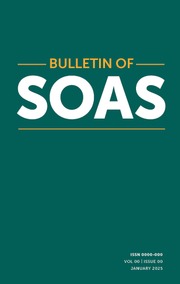The author of this erudite book endeavours to prove that the great Muslim mystic Ibn ʿArabi (1165–1240) was “strongly misread” (pp. 20, 54, 81, 140, etc.) as a tolerant universalist by the leading representatives of Esoteric Perennialism, such as Ivan Aguéli, René Guénon, Frithjof Schuon, William Chittick, S.H. Nasr and Reza Shah-Kazemi. The author's goal is to reclaim Ibn ʿArabi for Islam, while also exposing the sinister intellectual roots of Perennialism, especially Schuon's. The book contains four chapters, an introduction, a conclusion, and notes, but no bibliography, which somewhat obscures the intellectual genealogy of the author himself. In my opinion, Lipton has succeeded in showing that Ibn ʿArabi is a profoundly Muhammadan thinker, notwithstanding his occasional assertions of religious tolerance. Those who argue otherwise, citing Ibn ʿArabi's celebrated verses in which he professes his acceptance of all religious beliefs, are, in Lipton's view, blinkered by their Perennialist-universalist assumptions not just about Ibn ʿArabi and Sufism, but religion as a whole (pp. 53–4 and 80–83). In Lipton's view, the disparate visions of God that Ibn ʿArabi seems to accept and validate are, in the end, “totally subsumed within the legal authority of both the Qur'an and the Prophet Muhammad” (p. 81). Therefore, “the religions of the Protected People [i.e. the Jews and Christians] are indeed abrogated by the appearance of Muhammad's sharia, and their laws are thus technically invalidated” (p. 82). To prove his re-reading of Ibn ʿArabi as exclusivist as opposed to inclusivist, Lipton analyses numerous passages from Ibn ʿArabi's major works, Ringstones of Wisdom and Meccan Revelations. With the exception of several relatively minor points, this part of Lipton's discourse is credible and convincing. What strike me as problematic are his constant attempts to relate Ibn ʿArabi's ideas and their interpretations by modern-day scholars to recent academic debates over race, right-wing European ideologies (especially fascism), Eurocentric liberalism, and colonialism. Inspired by these debates, the author made, in my view, a rather questionable decision to apply them to what Mark Sedgwick in his recent book calls “Western Sufism” (Oxford, 2017). This decision has prompted Lipton to depict Ibn ʿArabi's “ontological and epistemological understanding of reality [as] inherently political” (p. 58; cf. 175 and 177). Because any serious scholar of his legacy will find this assertion hard to swallow, Lipton seeks to justify it by showing Ibn ʿArabi's involvement in state politics of his age. Thus, in Lipton's opinion, the fact that Ibn ʿArabi advised a Seljuk ruler regarding state policy vis-à-vis his Christian subjects indicates that his highly arcane and esoteric vision of God, the cosmos and human beings had wide-ranging political implications or may even be construed as an ideology of “Islamic imperialism” (pp. 114–9 and 177–81). One should point out that the image of a Sufi master giving advice to a ruler is a common one in Sufi literature. It does not mean that the shaykhs so portrayed necessarily harboured political aspirations or that their teachings had real political implications. In his desire to politicize Ibn ʿArabi by “situating him in his own regime of power” (p. 54), Lipton misreads the episode in which the mystic helped someone to restore his “property” (milk) confiscated by a Tunisian ruler as evidence of Ibn ʿArabi's ability to restore that person's “[political] authority” (mulk) (62 and 214 n. 57). Standing on this shaky evidential ground, Lipton, patronizingly chides Marshall Hodgson for his “distorting presuppositions” regarding Sufism's “depoliticized, universalist and transhistorical” nature (p. 59). Likewise, presenting Ibn ʿArabi's theological ruminations about the People of the Book as a “grammar of universal monarchy” and “the celebration of mastery over a multiplicity of lesser lords and subject populations” (p. 82) seems unwarranted to me. Ibn ʿArabi may indeed have claimed mastery over other “knowers of God” (‘arifun bi-llah), but his claim had no tangible political implications assumed by Lipton on a far-fetched analogy with modern European imperialism (pp. 82–3, 96–7 and 153–6). In sum, Lipton's political re-reading of Ibn ʿArabi is the least convincing aspect of his study. It is but a byproduct of his underlying intention to derive the intellectual roots of Schuon's Perennialism from Kant's philosophy. In his quest, Lipton enthusiastically embraces the ideas of those representatives of subaltern and postcolonial studies who have summarily condemned Kant as “racist” and “supremacist” (pp. 151–70). Lipton uses this damning image of Kant to dethrone Schuon by depicting him as an heir to nineteenth-century Eurocentric racism, anti-Semitism and Aryanism that take their origin in Kant, Schlegel and German Romanticism (pp. 121–6). Because Aryanism is indirectly implicated in the Nazi atrocities (p. 170), what more damage can one do to someone's intellectual credibility? Putting aside Lipton's quarrel with Schuon and other Perennialists, I would point out the absurdity of the “postmodern” claims, uncritically cited by Lipton, that the notion of a “universal beyond time and space” was seminal in the formation of “European imperialism since the end of the fifteenth century” (p. 153) or that the establishment of the Greenwich meridian in 1884 signalled the fateful shift of perspective from a certain “ethnic centre” to the “universal point of view” that validated Europe's global domination (p. 154). First, such assertions are irrelevant to the author's immediate purpose and, second, they are tenuous, because representatives of many societies consider their homeland the navel of the universe and their worldview the only true and authentic one. Whenever they have the ability to impose their perspective on the rest of humankind, they will not hesitate to do so. However, to confuse ideas and political actions or to argue that the ideas inevitably come first is problematic, either in the case of Ibn ʿArabi or European imperialism. Finally, by accusing the Perennialists of exclusivism and presenting his interpretation of Ibn ʿArabi as more objective, Lipton implicitly excludes them from the ranks of the mystic's legitimate interpreters. In so doing he runs into the very “postmodern paradox” that he himself recognizes: exclusivism is inherent in any claim to truth (p. 181).
No CrossRef data available.


